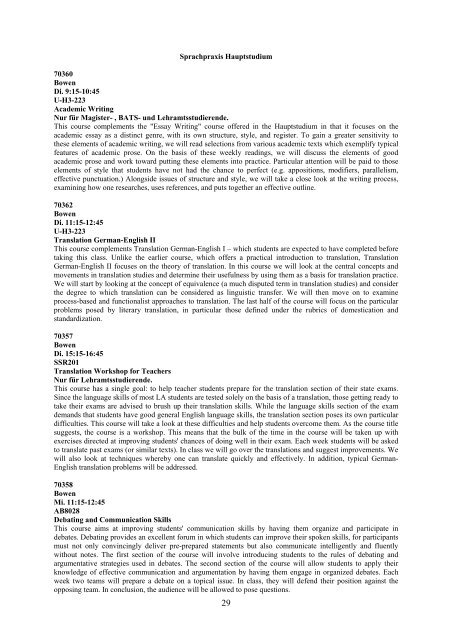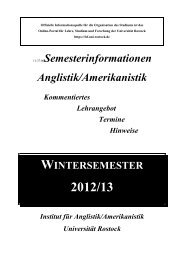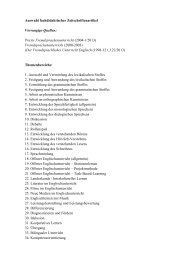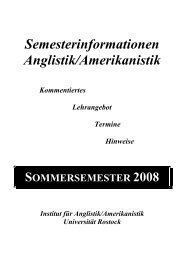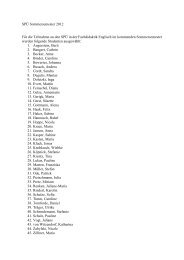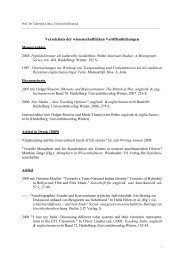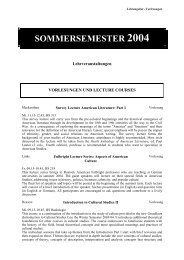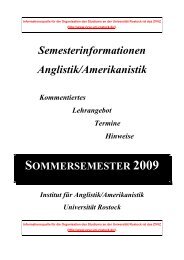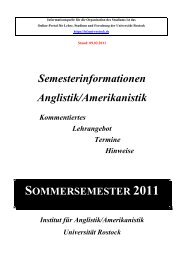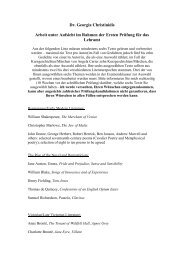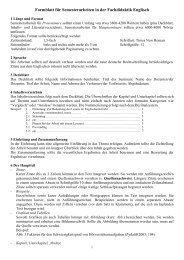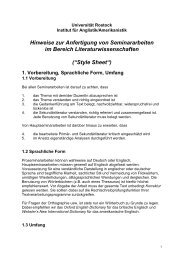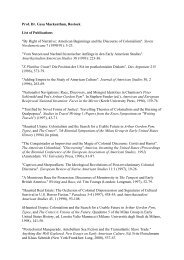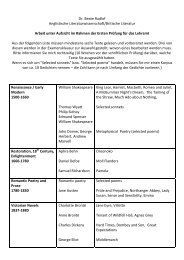Wintersemester 2011/12 - Institut für Anglistik/Amerikanistik ...
Wintersemester 2011/12 - Institut für Anglistik/Amerikanistik ...
Wintersemester 2011/12 - Institut für Anglistik/Amerikanistik ...
Sie wollen auch ein ePaper? Erhöhen Sie die Reichweite Ihrer Titel.
YUMPU macht aus Druck-PDFs automatisch weboptimierte ePaper, die Google liebt.
Sprachpraxis Hauptstudium<br />
70360<br />
Bowen<br />
Di. 9:15-10:45<br />
U-H3-223<br />
Academic Writing<br />
Nur für Magister- , BATS- und Lehramtsstudierende.<br />
This course complements the "Essay Writing" course offered in the Hauptstudium in that it focuses on the<br />
academic essay as a distinct genre, with its own structure, style, and register. To gain a greater sensitivity to<br />
these elements of academic writing, we will read selections from various academic texts which exemplify typical<br />
features of academic prose. On the basis of these weekly readings, we will discuss the elements of good<br />
academic prose and work toward putting these elements into practice. Particular attention will be paid to those<br />
elements of style that students have not had the chance to perfect (e.g. appositions, modifiers, parallelism,<br />
effective punctuation.) Alongside issues of structure and style, we will take a close look at the writing process,<br />
examining how one researches, uses references, and puts together an effective outline.<br />
70362<br />
Bowen<br />
Di. 11:15-<strong>12</strong>:45<br />
U-H3-223<br />
Translation German-English II<br />
This course complements Translation German-English I – which students are expected to have completed before<br />
taking this class. Unlike the earlier course, which offers a practical introduction to translation, Translation<br />
German-English II focuses on the theory of translation. In this course we will look at the central concepts and<br />
movements in translation studies and determine their usefulness by using them as a basis for translation practice.<br />
We will start by looking at the concept of equivalence (a much disputed term in translation studies) and consider<br />
the degree to which translation can be considered as linguistic transfer. We will then move on to examine<br />
process-based and functionalist approaches to translation. The last half of the course will focus on the particular<br />
problems posed by literary translation, in particular those defined under the rubrics of domestication and<br />
standardization.<br />
70357<br />
Bowen<br />
Di. 15:15-16:45<br />
SSR201<br />
Translation Workshop for Teachers<br />
Nur für Lehramtsstudierende.<br />
This course has a single goal: to help teacher students prepare for the translation section of their state exams.<br />
Since the language skills of most LA students are tested solely on the basis of a translation, those getting ready to<br />
take their exams are advised to brush up their translation skills. While the language skills section of the exam<br />
demands that students have good general English language skills, the translation section poses its own particular<br />
difficulties. This course will take a look at these difficulties and help students overcome them. As the course title<br />
suggests, the course is a workshop. This means that the bulk of the time in the course will be taken up with<br />
exercises directed at improving students' chances of doing well in their exam. Each week students will be asked<br />
to translate past exams (or similar texts). In class we will go over the translations and suggest improvements. We<br />
will also look at techniques whereby one can translate quickly and effectively. In addition, typical German-<br />
English translation problems will be addressed.<br />
70358<br />
Bowen<br />
Mi. 11:15-<strong>12</strong>:45<br />
AB8028<br />
Debating and Communication Skills<br />
This course aims at improving students' communication skills by having them organize and participate in<br />
debates. Debating provides an excellent forum in which students can improve their spoken skills, for participants<br />
must not only convincingly deliver pre-prepared statements but also communicate intelligently and fluently<br />
without notes. The first section of the course will involve introducing students to the rules of debating and<br />
argumentative strategies used in debates. The second section of the course will allow students to apply their<br />
knowledge of effective communication and argumentation by having them engage in organized debates. Each<br />
week two teams will prepare a debate on a topical issue. In class, they will defend their position against the<br />
opposing team. In conclusion, the audience will be allowed to pose questions.<br />
29


